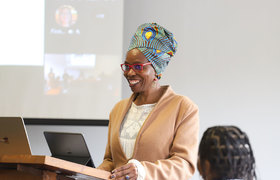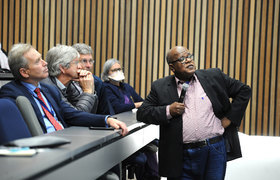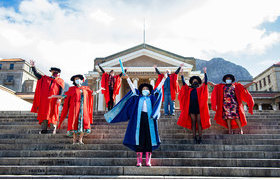Think tank explores the scholarship of transformation
12 September 2023 | Story Stephen Langtry. Photos Lerato Maduna. Read time 6 min.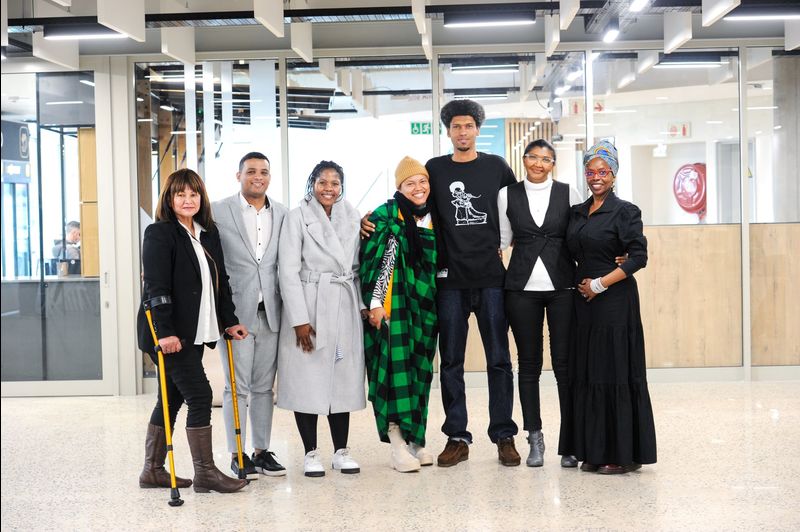
“We need to reckon with exclusion and who’s excluded, and begin to find the language to name the trauma,” said Deputy Vice-Chancellor (DVC) for Transformation, Student Affairs and Social Responsiveness Professor Elelwani Ramugondo. Speaking at the second session of the "Transformation: A Humanising Praxis Think Tank Series”, Professor Ramugondo discussed the necessity for scholarship in the context of transformation.
The event took place on 31 August at the Hasso Plattner School of Design Thinking Afrika (d-school Afrika) at the University of Cape Town (UCT). The session, which aimed to explore the multifaceted dimensions of transformation, provided an enlightening and thought-provoking experience for attendees.
The conversation started with opening remarks from Quinton Apollis, setting the tone for a day filled with insightful discussions on transformation. Apollis is the inclusivity and capacity-building specialist at UCT’s Office for Inclusivity & Change (OIC). He emphasised the importance of student access and support in the transformation process.
The scholarship of transformation
In her welcome address, Ramugondo, said, “Transformation must be theorised within context.” She highlighted that transformation must be theorised and grounded in lived experiences to avoid empty pronouncements.
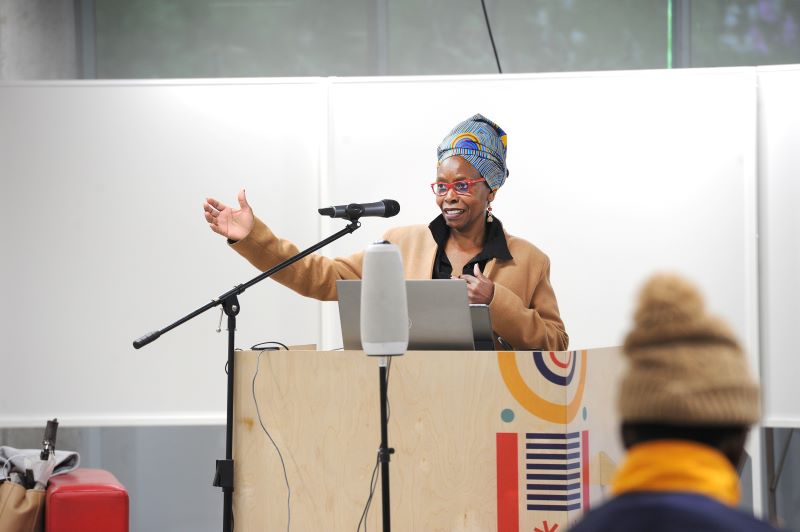
The DVC introduced two strands of scholarship on transformation: the UCT Anti-Racism Conversation Series and the Humanising Think Tank Series. The former focused on hard conversations about uncomfortable realities, while the latter aimed to explore alternative perspectives without escaping existing realities. Ramugondo underscored the importance of these discussions in addressing systemic violence in order to benefit all members of society.
Disparities
Dr Zamambo Mkhize, a lecturer in African Feminist Studies at the African Gender Institute at UCT, was the keynote speaker. She stressed the disparities in advantages and disadvantages faced by students based on their identities in different contexts. Dr Mkhize discussed the impact of neoliberalism in higher education, where the government steps back, allowing the private sector to compete for resources, potentially widening disparities.
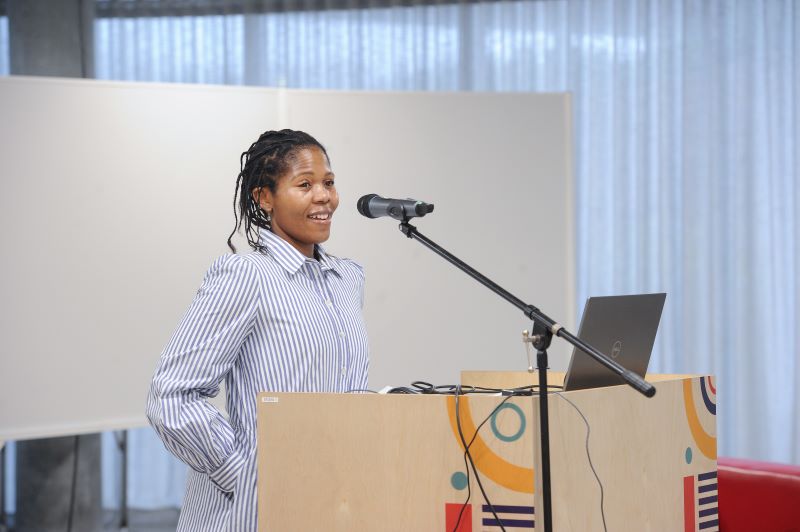
Mkhize drew attention to historical legacies, commenting on how South Africa’s apartheid era has left deep-seated issues unresolved. “The implications of offering access to disadvantaged students does not end, but rather begins at the point of entry,” she said. Despite the promises of transformation and democracy in 1994, the dominance of white individuals in various professions, including academia, continues to persist.
She critiqued the idea of meritocracy, where students are expected to succeed solely based on their own merit, highlighting its limitations in achieving academic justice. She discussed the challenges faced by students, including financial barriers, navigating new-found freedom at university, social integration, and living conditions – especially for first-year students. “Student academic outcomes are not only contingent upon academic structures and systems that support meaningful teaching and learning activities, but how students can negotiate their social space within institutions.” She emphasised the importance of nurturing resilience and grit among students, qualities often overlooked in South African education.
Panel discussion
The session continued with a panel discussion featuring two experts: Edwina Ghall, the disability service manager at the OIC; and Dr Christie van Zyl, an indigenous wellness practitioner, multimedia artist, and social entrepreneur who is currently piloting the Indigenous Healthcare Advisory Service at UCT’s Student Wellness Service. They delved into various aspects of transformation, sharing their unique insights and experiences.
Ghall shared her life journey. She highlighted the lack of support and understanding for disabilities in school. Despite facing adversity, she pursued higher education, earning a degree in social work. Her story reflects her resilience and determination to overcome obstacles.
Dr Van Zyl discussed the difficulties of expressing her spiritual experiences and cultural identity within an institutional setting that lacked understanding. She expressed concern for students facing economic hardships and a lack of access to healthcare services within the institution.
Finding the language
The question-and-answer session, moderated by Apollis, provided an opportunity for attendees to engage with the speakers and panellists. The discussion that followed was candid and thought-provoking, with speakers and audience members exploring the complexities of power and its implications for transformation.
As the session drew to a close, Ramugondo delivered her final remarks, reminding everyone that transformation is not a passive process but a call to action. She expressed gratitude for contributions while revealing a deep sense of urgency.
Ramugondo touched on various themes during her address. She drew attention to the challenges in the education system, particularly for students. The discussion covered issues like feedback for students, exclusion, and the impact of language on learning.
She underlined the importance of removing barriers to universal access in education and addressed the power dynamics within institutions and spoke passionately about the need for healing and inclusivity, particularly for African students who face systemic barriers.
The DVC’s final remarks served as a powerful call for change, inclusivity, and reflection within the education system. Her words underscored the urgency of addressing systemic issues and the need for collective action to create a more equitable and inclusive learning environment.
 This work is licensed under a Creative Commons Attribution-NoDerivatives 4.0 International License.
This work is licensed under a Creative Commons Attribution-NoDerivatives 4.0 International License.
Please view the republishing articles page for more information.



















